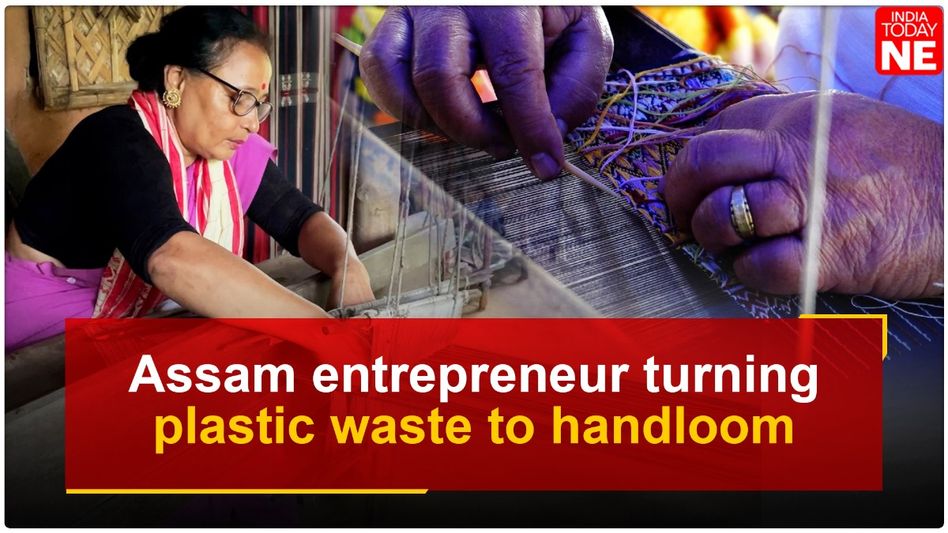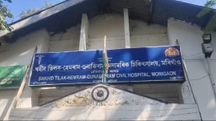Transforming trash into treasure: How a woman entrepreneur in Kaziranga is empowering communities and protecting the environment
In the heart of Assam’s Kaziranga, a region renowned for its rich biodiversity and the world’s largest population of one-horned rhinoceroses, a remarkable story of innovation and environmental stewardship is unfolding. Rupjyoti Saikia Gogoi, a 47-year-old resident of this area, has embarked on a unique mission to combat the growing problem of plastic waste while simultaneously offering a source of livelihood to the local community. Her initiative, known as Village Weaves, stands as a testament to the power of grassroots efforts in addressing global challenges.

In the heart of Assam’s Kaziranga, a region renowned for its rich biodiversity and the world’s largest population of one-horned rhinoceroses, a remarkable story of innovation and environmental stewardship is unfolding. Rupjyoti Saikia Gogoi, a 47-year-old resident of this area, has embarked on a unique mission to combat the growing problem of plastic waste while simultaneously offering a source of livelihood to the local community. Her initiative, known as Village Weaves, stands as a testament to the power of grassroots efforts in addressing global challenges.
A Vision Born from Necessity
Kaziranga National Park is not just a sanctuary for wildlife; it is also a magnet for tourists from around the globe. However, the influx of visitors has brought with it an unfortunate byproduct—plastic waste. The sight of discarded plastic bags, wrappers, and bottles marring the pristine landscapes deeply troubled Gogoi. Recognizing the dual problem of pollution and unemployment in her community, she envisioned a solution that would turn waste into something valuable.
In 2004, driven by her concern for the environment and her desire to uplift her community, Gogoi founded Village Weaves. She began experimenting with the plastic waste she collected from around Kaziranga, weaving it into traditional handloom products. Despite having no formal training, her determination and innate creativity led her to develop a method that successfully transformed plastic waste into durable, aesthetically pleasing items like handbags, table mats, doormats, and decorative pieces.
Empowering Women, Enriching Lives
The impact of Gogoi’s initiative extends far beyond environmental conservation. Over the past two decades, she has trained more than 2,300 women, not just in Assam but across India, in the art of recycling plastic waste through handloom weaving. This skill has empowered these women to earn a sustainable livelihood, fostering economic independence in regions where job opportunities are scarce.
“We use all kinds of plastic covers and wrappers to weave our products, which gives them a colorful and unique finish,” says Gogoi. In 2012, she expanded her venture by opening Kaziranga Haat, a small shop in her village where these handloom products are sold. The success of this local initiative soon transcended borders, with an increasing demand for these eco-friendly products from international markets.
A Community Transformed
What began as a small, personal project has blossomed into a statewide movement. Gogoi’s efforts have now reached 35 villages across Assam, where hundreds of women are involved in the production of handloom items made from plastic waste. The impact on their lives has been profound. Many women, who once had no source of income, now contribute significantly to their household finances. During peak tourist season, they can earn between $150 to $200 per month from the sale of their handcrafted items.
The success of Village Weaves has also fostered a sense of community. Entire families often participate in the initiative, from collecting plastic waste to weaving and marketing the products. Gogoi’s own family plays a crucial role in her enterprise, assisting with everything from administrative tasks to managing the household when she travels for workshops.
Challenges and Aspirations
Despite her achievements, Gogoi faces ongoing challenges. The outdated handlooms that the women use limit their productivity and the quality of their products. Gogoi dreams of acquiring modern looms and better technology to enhance their craft and meet the growing demand, especially from foreign tourists who appreciate the unique, eco-friendly products.
Gogoi’s work has not gone unnoticed. She is frequently invited by state governments and private organizations to conduct workshops, teaching rural women how to turn trash into treasure. Her travels have taken her to various states across India, where she shares her knowledge and inspires others to follow in her footsteps.
“I’ve had the opportunity to teach in places like Arunachal Pradesh, Maharashtra, West Bengal, and Delhi,” she says with pride. “It’s a great feeling to be able to pass on this knowledge, but there are always challenges.”
The Road Ahead
As she looks to the future, Gogoi remains committed to her dual mission of environmental conservation and community empowerment. Her story is a powerful reminder of the impact that one individual can have when driven by passion and purpose. While there are hurdles to overcome, her journey continues to inspire others, proving that sustainable solutions to global problems often start at the grassroots level.
Rupjyoti Saikia Gogoi’s initiative is more than just an effort to clean up her surroundings; it is a beacon of hope for communities grappling with poverty and environmental degradation. By transforming plastic waste into valuable products, she has not only preserved the natural beauty of Kaziranga but has also woven a better future for thousands of women across Assam and beyond.
Copyright©2026 Living Media India Limited. For reprint rights: Syndications Today









